By Chris Spangler
Producers’ concerns about solar farms consuming valuable agricultural land were a top takeaway from U.S. Sen. Tammy Baldwin’s visit to Whitewater Saturday morning.
Baldwin and state Rep. Don Vruwink held a joint listening session at the Luke and Brandi Goessling farm west of Whitewater.
The Goesslings and their sons, Rudy and Hank, grow corn and soybeans on 750 acres. The farm has been in the family since 1938.
Janesville farmer Doug Rebout served as moderator for the discussion.
The senator and Assemblyman briefed area growers, farmers and food processors on issues that have come before Congress and the Wisconsin Legislature, as well as fielded questions and concerns from attendees.
The discussion on solar farm developers being able to outspend farmers when buying agricultural land stemmed from opening remarks by Vruwink, who currently represents the 43rd Assembly District, but is the Democratic candidate for the newly redrawn 33rd District in the Nov. 8 general election.
“As I talk to farmers, some of their concerns are the rising cost of land (and) that they can’t afford to buy it because investors are now buying up farmland …,” he said. “I think the cost went up 23% just in the last year or so. That will prevent young people from getting into farming.”
He noted that dairy producers are worried about getting enough labor to expand, and many farmers are concerned about the solar industry taking over farmland.
“Part of it is that … in the last six years in Madison, we’ve been talking about helping farmers with farm succession plans to help how they’re going to get out of it. We really haven’t done anything on this,” Vruwink said.
He said he has two cousins who are dairy farmers in their 50s with no children to take over the farm.
“The solar companies are going hard on them, saying, ‘we’ll give this much every month to take your land,’ and there are people upset with them who don’t want them to sell it, so we have to keep costs down so we can get younger farmers into agriculture. If they could sell their farms to someone for the value of its worth, they would do it tomorrow rather than give it to a solar company,” the representative said.
An attendee questioned whether solar subsidies are driving up the cost.
“The reason solar companies are investing in the land is because they are getting subsidized by the federal government,” he stated.
Sen. Baldwin said that legislation sent to President Joe Biden includes additional subsidies for solar, wind and other efforts, “as it is very much focused on reducing the nation’s reliance on fossil fuels.”
The Environmental Quality Incentives Program (EQIP) helps farmers install solar on their buildings, yet, she said, “We certainly want to be providing those sort of incentives where we can, but not selling the farm for a solar farm.”
“So the problem’s going to get worse?” a farmer asked.
“Um, yeah,” Baldwin replied.
Rebout told the senator that farmers who are trying to expand are competing with solar farm developers.
“Got a neighbor that’s getting older and looking at getting out? Yeah, we’d love to go and get that land. A solar company that’s being subsidized comes in and has a lot more money. That kind of makes it rough for us at times,” he said.
Another attendee recalled that during the drought of 2012, farmers caught a lot of flak due to the “food-vs.-fuel” ethanol debate.
“So how is this anything different for the federal government trying to get sun for fuel, solar for fuel, versus food?” he asked.
“We’re going to have to be very careful in terms of how we do this,” Baldwin said. “There are lots of places that are good for solar that aren’t necessarily good for agriculture.”
Luke Goessling said that the farmers’ message can get lost in the conversation.
“The general public assumes, ‘OK, we’re putting up solar; it’s going to be on the roof of my shed (and) the roof of my house.,” he said. “They don’t realize what’s happening out here in rural America, where they’re taking up hundreds of acres because they’re (solar) getting that subsidy. They’re expecting you to have it on your garage or top of your house. … I think some of that gets lost on where it’s really ending up.”
“I’m going to certainly track this,” Baldwin vowed.
She said she and Iowa Republican U.S. Sen. Chuck Grassley are working on legislation regarding foreign ownership of agricultural lands.
“That’s something we are supposed to be keeping track of, but basically, it’s not being enforced right now. And we want to have a really clear sense of what that foreign ownership does for rural communities,” Baldwin said.
“But it seems like we need to be doing exactly the same thing with regard to solar use.”
Jim Raymond of Janesville, host of “Ag Matters” on WCLO/WJVL, said that he did not think anyone at the listening session objects to installing solar on rooftops.
“But the farms are such large pieces of land and we have been so active in trying to preserve farmland — there are programs for that. And suddenly this new thing comes along and we see neighboring farms where they take 1,000 acres and suddenly suck it out of production for the next 25 or 30 years, and we wonder why that’s there,” he told the legislators.
“Well, the reason it’s there is because those people are paying a thousand dollars an acre in rent on land that would rent for $200 or $250. So the owner of that farmland is saying, ‘Well Doris, why don’t we rent to the solar company?’ So it runs counter to almost everyone who’s talked so far.”
He said that farmland is valuable and producers are not in favor of large solar farms.
“It has pitted neighbors against neighbors,” Raymond said. “That’s going on in the background right now.”
Baldwin said this would be a big takeaway from Saturday’s gathering.
“This is why these sessions are so important to me, because it’s not something that has been brought to my attention,” she said.
Also discussed were several related issues, such as whether the tax base for solar farms is calculated on the agricultural land value or income potential.
Vruwink said there should be a difference.
“I have a sneaky feeling it’s probably on ag value. In Wisconsin, real estate taxes on ag land are much lower,” he said.
The Assemblyman noted that the droughts in the western United States and Europe are negatively affecting the food chains from those two areas. In addition, the Russian invasion has wreaked havoc on Ukrainian farmers getting their grain to market.
“We have to look at the world balance, because we don’t want food wars to take place in the world,” Vruwink said.
“So we have to look at what we want to promote here, because we are going to need this land for food in Wisconsin.”
He said that he believes the dairy industry out west will be struggling if water use is limited there, and “what California loses, we might gain here in Wisconsin.
“So we don’t want to take all of our land and put it in there (solar), because we’re going to need that because we’re going to have to be somebody who provides the food.”
Vruwink said there should be considerations when siting a solar farm, such as the proximity to a substation.
Food security
Rebout said that food security is national security.
“This is good to keep your eye on, because when it starts pitting one farmer or neighbor against another, you’ve got turmoil in the neighborhood,” Raymond told Baldwin.
An attendee added that “an entity like China or any foreign interest, Communist or otherwise, should not be allowed to buy farmland in this country. That’s a huge national security item.”
Baldwin said there is no federal law banning foreign ownership, although there is a law requiring that a foreign interest disclose land purchases.
However, it is not enforced, she noted.
“So Chuck Grassley and I have teamed up to require enforcement of it, but also to report to the public and to Congress the impact of foreign ownership on our rural communities and agriculture,” Baldwin said.
“The other thing that it doesn’t touch, but I would be really interested in hearing how we should grapple with this, is if I think about the really large foreign-owned meatpackers.”
She said they are becoming more and more vertically integrated so they are not only owning the farmland, but they also are owning the market animals.
“And I don’t know how we keep track of that because I think that’s a security issue too,” the senator said.
Vruwink said that farmers also have voiced concerns about there not being enough plants nearby where small producers can take their beef cattle or hogs for slaughter in a timely manner. Right now, it might take nine months to a year to get to an appointment.
“If we want to promote these smaller areas …, we need to do a better job of encouraging more meatpacking plants. I hear the regulations keep changing and it costs them to keep upgrading. When the regulations change, we need to give aid to those small processors so they can stay in business rather than close down,” he suggested.
Baldwin agreed.
“We really believe that part of the answer is getting a lot more local meat-processing and butcher shops. But you’re right: it’s a dying art,” she said.
Ethanol production
Turning to other issues, Raymond said that ethanol is important to the people at Saturday’s event.
“That’s where 25% to 30% of our corn crop goes. It’s up and running, it’s 10% to 15% of the fuel and it’s working. Agriculture has a kind of a small voice because only 2% of our population is agriculture, so we have to bring the rest of the people along and make them understand that ethanol is a big part of our market right now,” he said.
Baldwin replied that she is a “big fan” of ethanol and biofuels.
She said they are especially important now that the United States halted imports from Russia after its invasion of Ukraine.
“The 7% we were importing from Russia could easily be replicated by biofuels. We should be doing that,” she said. “In my mind, just as food is national security, so is energy. And to be able to domestically produce it is (important) …”
Succession plans
A farmer voiced concern that the inheritance tax plan is not compatible with succession, so often, farmers inheriting the family’s land have to sell off land to pay the taxes.
Baldwin reported that at the state level, Wisconsin can provide assistance with succession planning for farmers.
“If something happens before we have a succession plan in place, if the inheritance tax level is down low, our kids are dealing with the loss of parents and also having to deal with having to sell land to pay for those taxes. And that’s something that we would really like to avoid,” Goessling said.
Baldwin suggested that Wisconsin should be looking at growing agricultural cooperatives, where the economy of scale can be reached through a cooperative rather than a single farm.
Whitewater grocery
Brienne Diebolt Brown of Whitewater, the Democratic candidate for the 31st Assembly District, asked about assistance creating other kinds of cooperatives, such as those to help grocery or childcare providers.
She is a member of the board of directors of the Whitewater Grocery Co., which is trying to create a community cooperative market in the city.
“Grocery store co-ops are very dependent on the supply chain, and very often that supply chain comes from national cooperative purchasers and often those come from cooperatively owned farms. Is there a bill …. in terms of helping growing cooperatives?” she asked.
Baldwin said that anything independently introduced would be eyed for the Farm Bill, but that would be for agricultural cooperatives.
Brown said that the city cannot draw a grocery store unless the median income is $65,000, and Whitewater’s is $35,000 due to there being many low-income residents, college students and people on fixed incomes.
Vruwink said that the only good location for a grocery store is where a hotel recently was built, as it must be easily accessible by college students to boost customer traffic.
“No grocer will come in because there is no location that makes sense to them,” he said.
The legislator said he thinks the state should provide incentives for restaurants and other entities such as schools to use Wisconsin-made products from area farmers.
“I think that would be a win-win for us, but we’re so toxic that we can’t have those discussions,” Vruwink said of the political landscape.
Baldwin cited Northland College in Ashland, which locally sourced food for its campus. It required 50 percent by a certain year, and the hospital followed suit.
“They actually ended up having several new farms created because they had created a new demand for things,” she said. “That local economy has really changed.”
While there is no federal footprint for such an effort, Baldwin said that Whitewater, as a community, might consider establishing a similar effort to create demand.
“The food that our schoolchildren eat in Wisconsin, we could grow in Wisconsin and market that through a marketing cooperative,” Vruwink agreed. “If we had cooperatives like you said, Sen. Baldwin, … (we could) promote small farmers through this. And we could get more kids and young families involved in ag.”
Also Saturday, Baldwin was asked whether there is any federal help to address the labor shortage.
She noted that the Infrastructure Bill President Biden signed into law provides money to train workers in construction, broadband, bridge building and more.
She cited, as an example, the goal of having every lead lateral nationwide replaced in 10 years. To meet that huge goal, pipefitters and other related workers will be needed.
“There are work training programs and apprenticeship opportunities that are a part of that measure, but we don’t have an ag counterpart to that. So labor shortages in the ag sector, we need to be creative there too,” the senator said.
Baldwin overview
Baldwin is chair of the Senate Appropriations Subcommittee on Agriculture, Rural Development, Food and Drug Administration and Related Agencies.
During her opening remarks, she noted that draft agriculture appropriations legislation that debuted last month highlights the dairy industry.
“The Dairy Business Innovation Program is one I helped put into the 2018 Farm Bill and funded through appropriations measures,” she said.
“We’ve been able to increase the funding for the program significantly since it was first authorized. This goes to Wisconsin producers and processors to help add value to their products, their operation or to create efficiencies that lower the cost of production and open new markets, etc.,” Baldwin added.
The national allocation will be funded at a significant increase of $25 million, she reported.
“We also have increased funding for the Healthy Fluid Milk Incentive Program, which allows SNAP (food stamp) recipients to purchase dairy products. And as we know, we have a thriving corn and ethanol industry, and this legislation directs the USDA to identify any market barriers to get access for the biofuels industry,” the senator said.
She noted that she worked closely with U.S. Sen. John Hoeven, a North Dakota Republican, to increase investments in rural development and conservation programs, as well as rural broadband programs.
“The Inflation Reduction Act enroute to the president’s desk includes a lot of investment in lowering the carbon output in the country, and agriculture is a big piece of that,” the senator said, adding that it funds EQIP and conservation stewardship programs, among others.
“These programs also provide farmers with financial and technical assistance to maintain land for generations to come,” Baldwin said.
The act also provides debt relief for distressed farm borrowers and assistance for underserved farmers and ranchers, including those who live in high-poverty areas, veterans, and beginning farmers and ranchers, according to the senator.
Finally, next year, Congress is due to reauthorize the Farm Bill, the first time since 2018.
Baldwin said her highest priorities are looking at strong crop insurance and dairy risk-management programs; continuing investments in clean water and rural broadband infrastructure and in trade-promotion programs to increase exports and to establish new expanded trade relationships; and to continue upping support for the Dairy Business Innovation Program.
Baldwin concluded the gathering by re-emphasizing the importance of listening sessions such the one at the Goessling farm.
“Thank you for your input, especially on the solar farm, the first one you hit me with,” she said. “It’s like now I know and we’re going to go back and chew on that.”
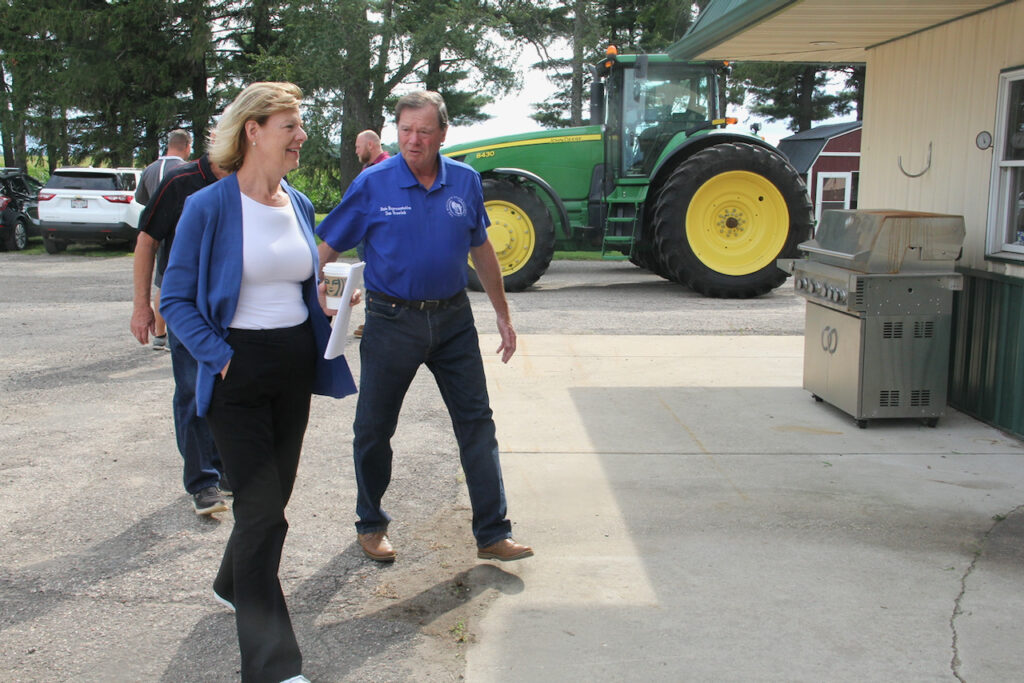
State Rep. Don Vruwink accompanies U.S. Sen. Tammy Baldwin as they enter a shed at the Luke and Brandi Goessling farm west of Whitewater. The shed was the site of a Saturday morning listening session on agricultural issues.
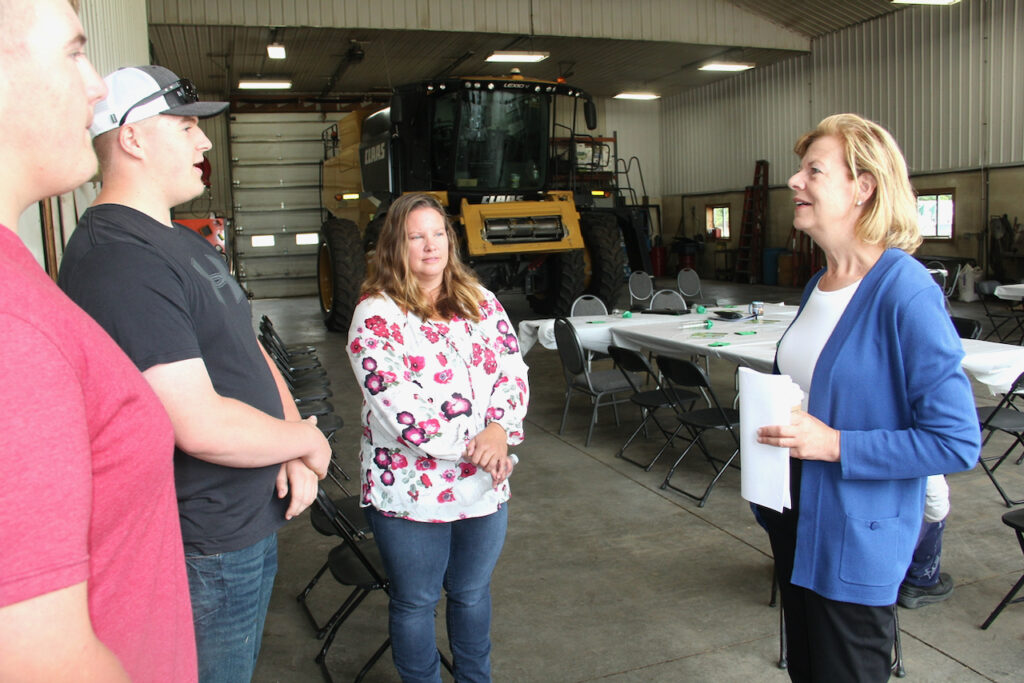
Hank, from left, Rudy and Brandi Goessling visit with U.S. Sen. Tammy Baldwin before a listening session Saturday held on the Goesslings’ Whitewater farm.
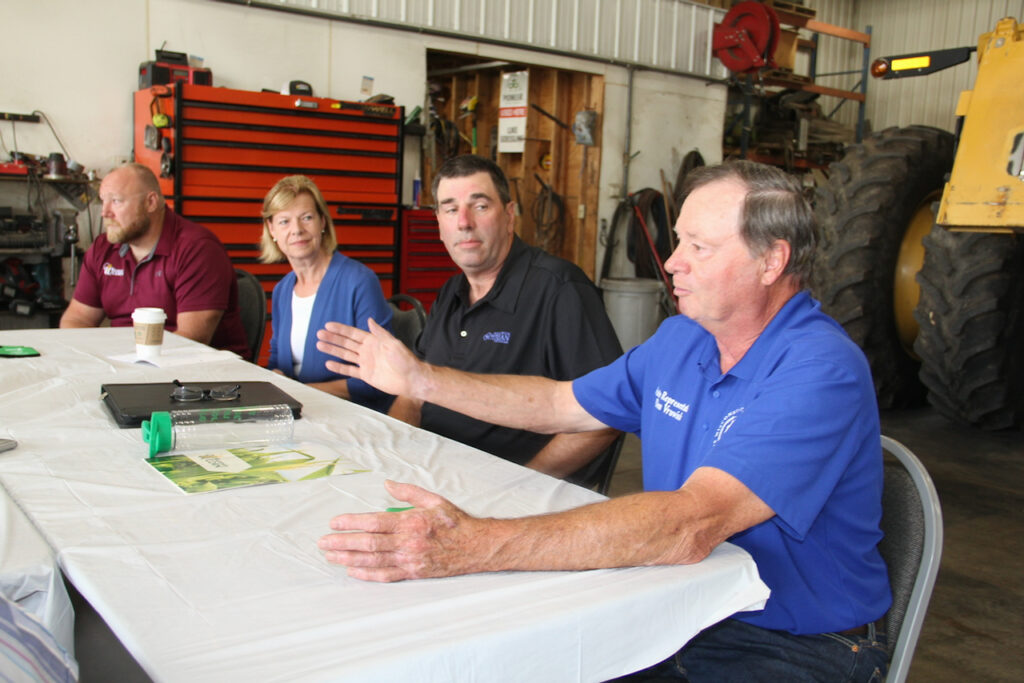
State Rep. Don Vruwink, at right, shares constituent concerns about solar farms being able to outspend farmers for agricultural land. Listening are host Luke Goessling, from left, U.S. Sen. Tammy Baldwin, and Janesville farmer and moderator Doug Rebout.
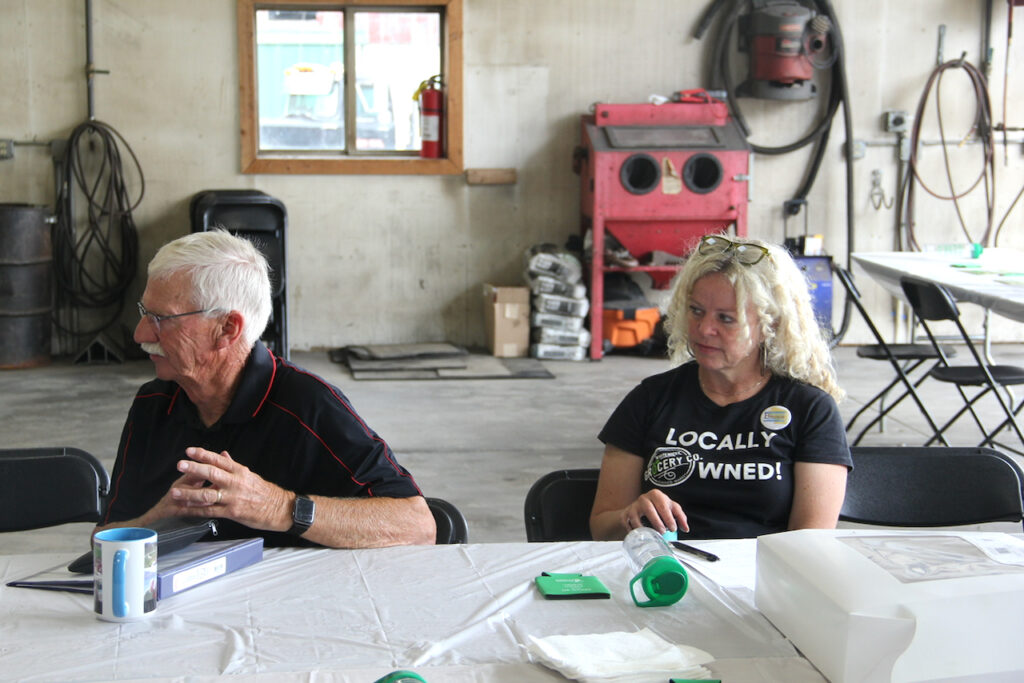
Jim Raymond, Janesville, and Brienne Brown, Whitewater, listen to U.S. Sen. Tammy Baldwin speak about the importance of cooperatives Saturday. Raymond is the host of “Ag Matters” on WCLO/WJVL, while Brown is a Whitewater Common Council member and candidate for the 31st Assembly District in the November election.
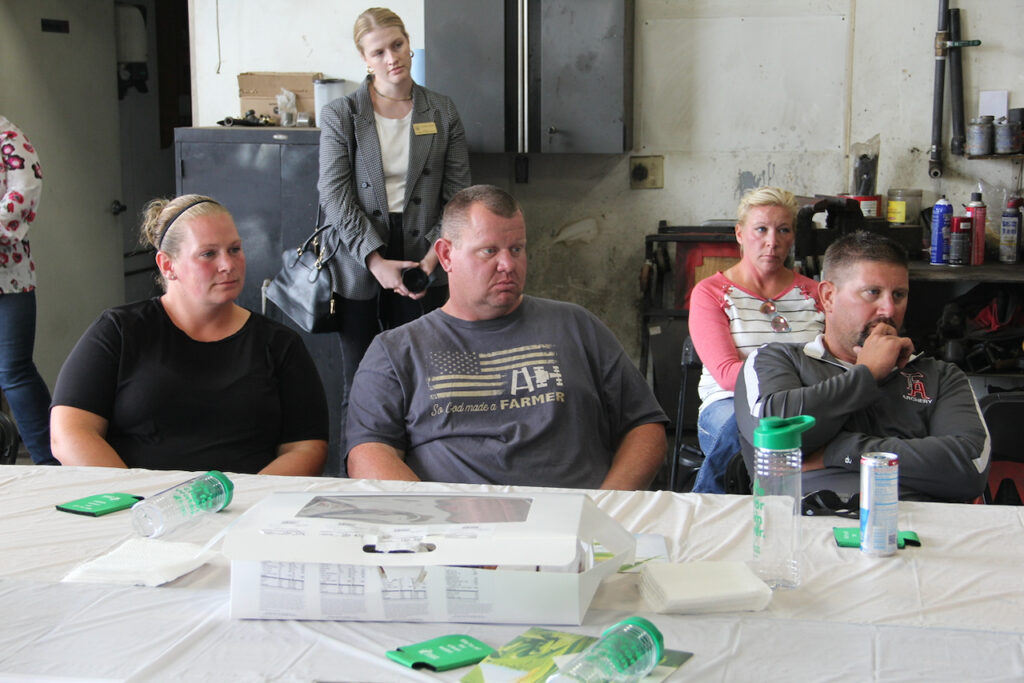
Heather and Matt Reu, Fort Atkinson, seated at the table and from left, and Casey Kelleher, Whitewater, listen Saturday to the legislators speak. Kelleher is a director on the Wisconsin Corn Promotion Board, representing District 8, which includes Jefferson, Walworth, Racine and Kenosha counties.
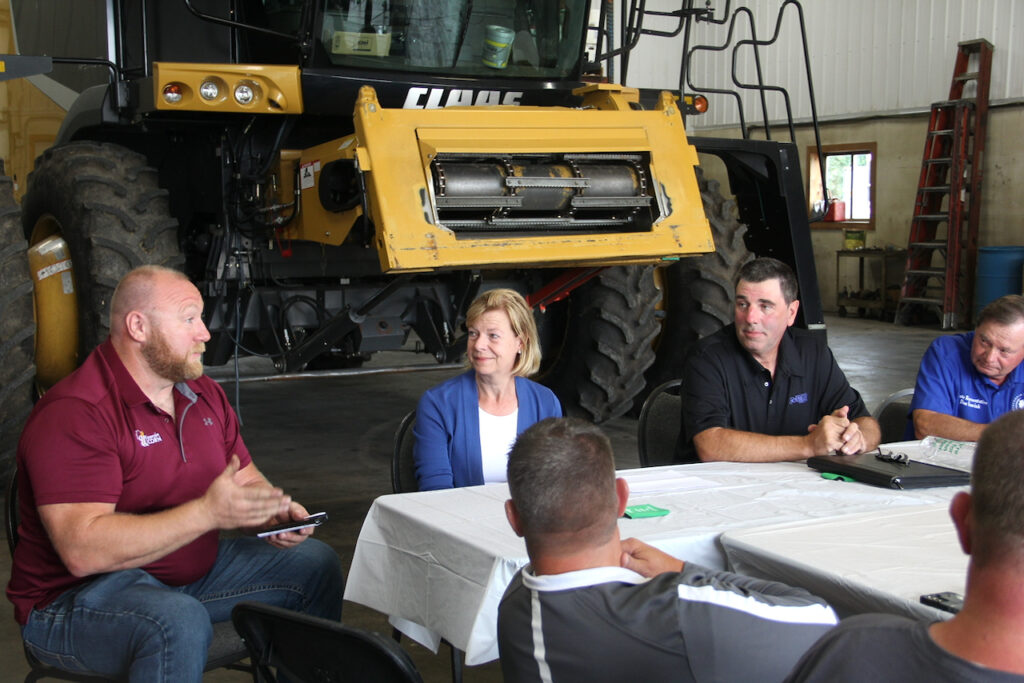
Event host Luke Goessling, from left, remarks on succession planning for farmers. Among those listening are U.S. Sen. Tammy Baldwin, Janesville farmer and moderator Doug Rebout and state Rep. Don Vruwink.
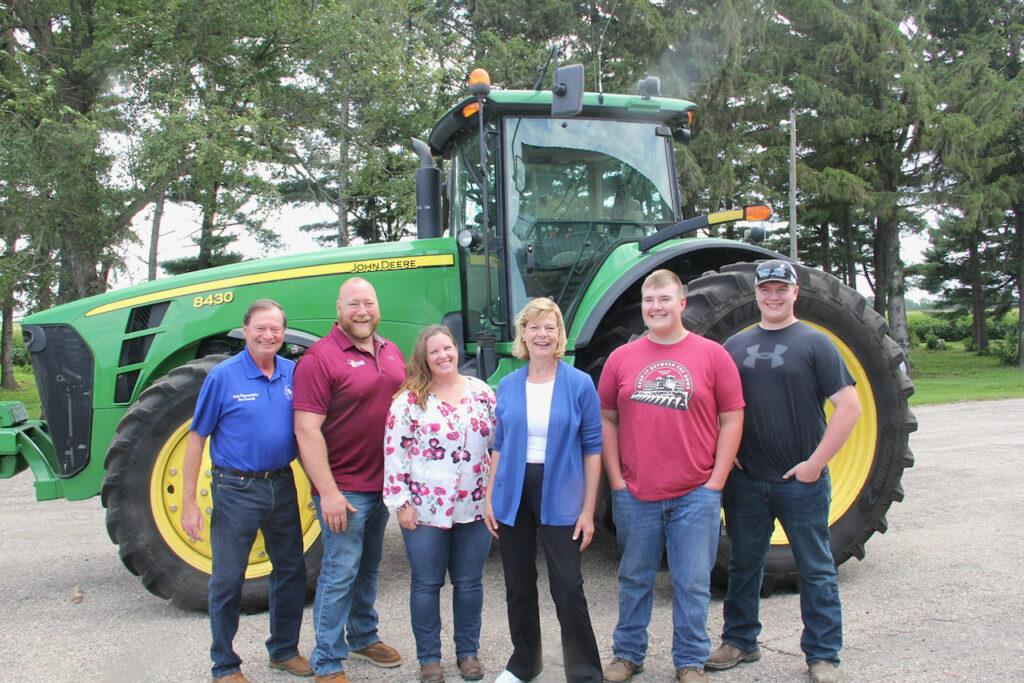
State Rep. Don Vruwink, from left, listening session hosts Luke and Brandi Goessling, U.S. Sen. Tammy Baldwin, and Goessling family members Hank and Rudy gather for a photo after the listening session.
Chris Spangler photos.
This post has already been read 7869 times!
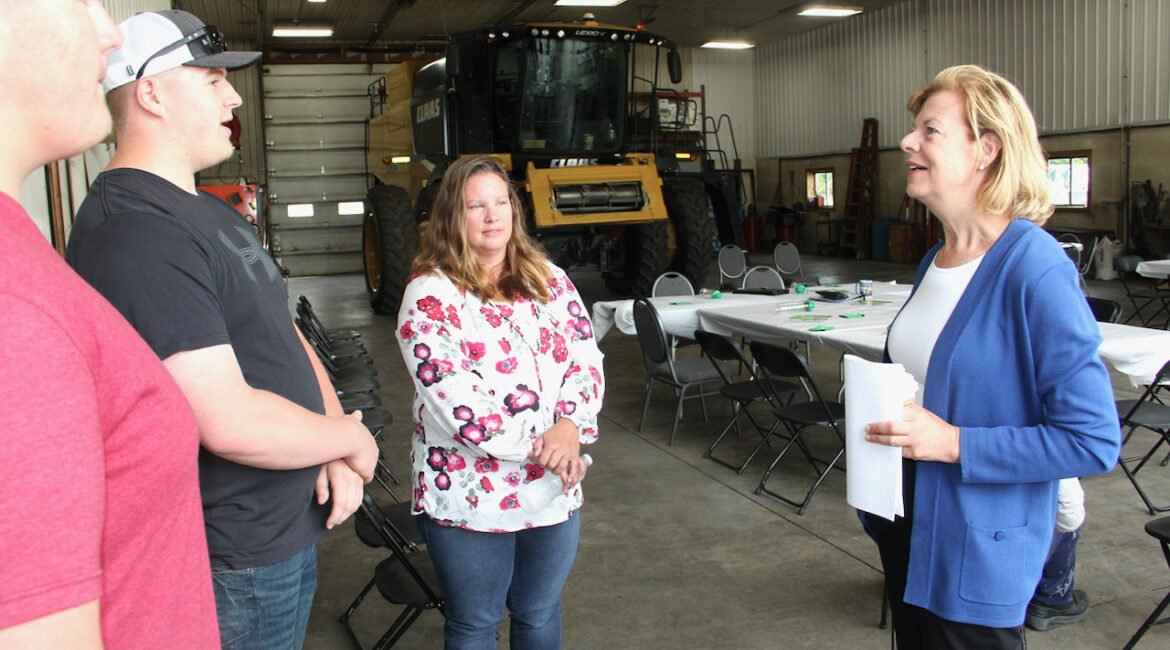
Agrivoltaic Solar and Community Solar, where farmers continue to own and farm the land, are often offered as an alternative to Utility-owned solar, in which farmers cannot concurrently farm the land. It sounds like all of the discussion only referred to issues regarding Utility Solar. Of course, the Wisconsin Clean Energy Plan, first published by the Evers Administration, discusses Community Solar as a viable direction for Wisconsin. Was the Wisconsin Clean Energy Plan referenced during this listening session? If not, all who attended should be sent proper updates.